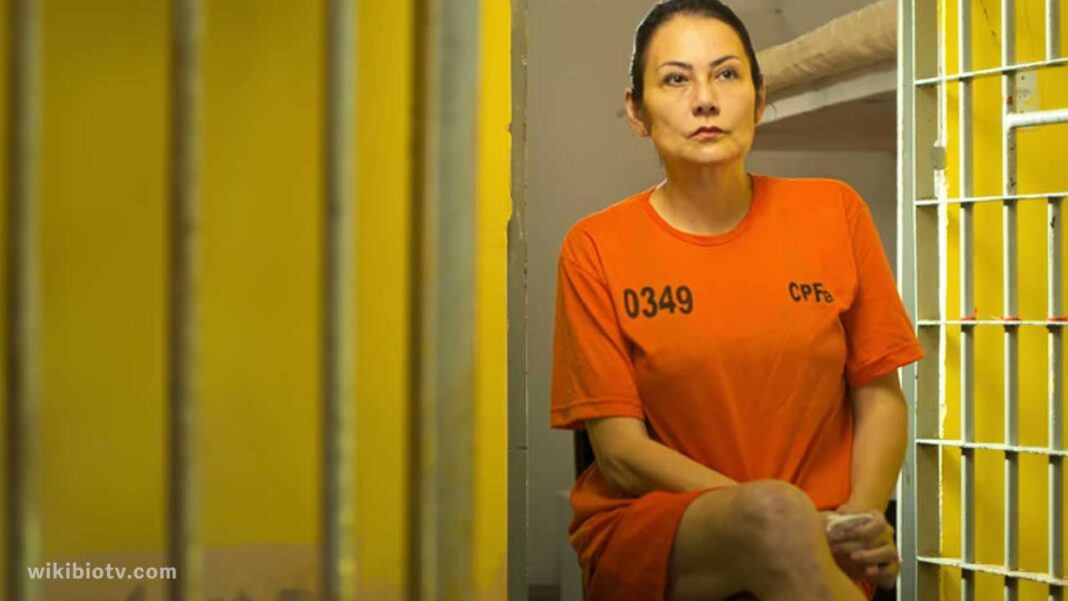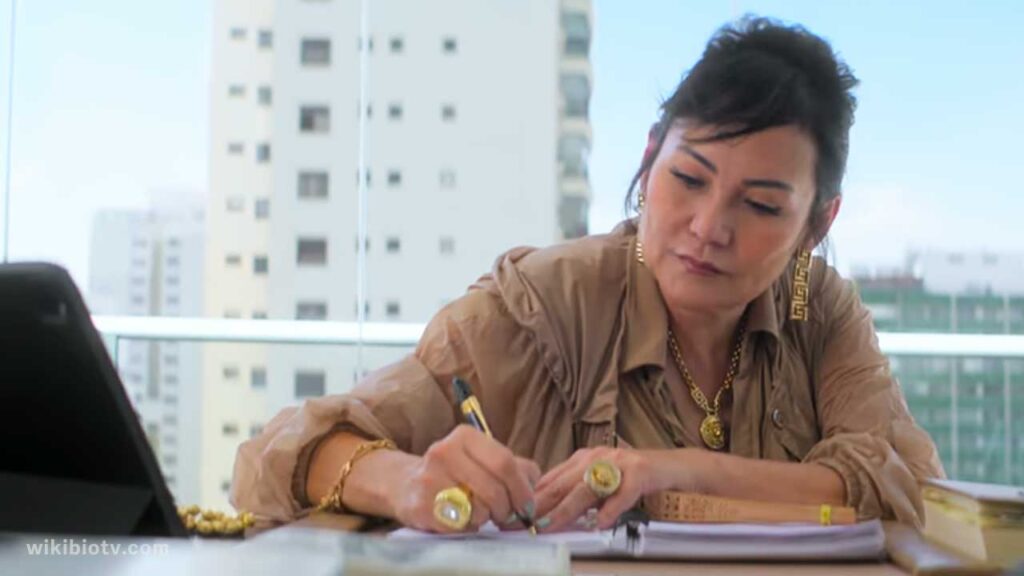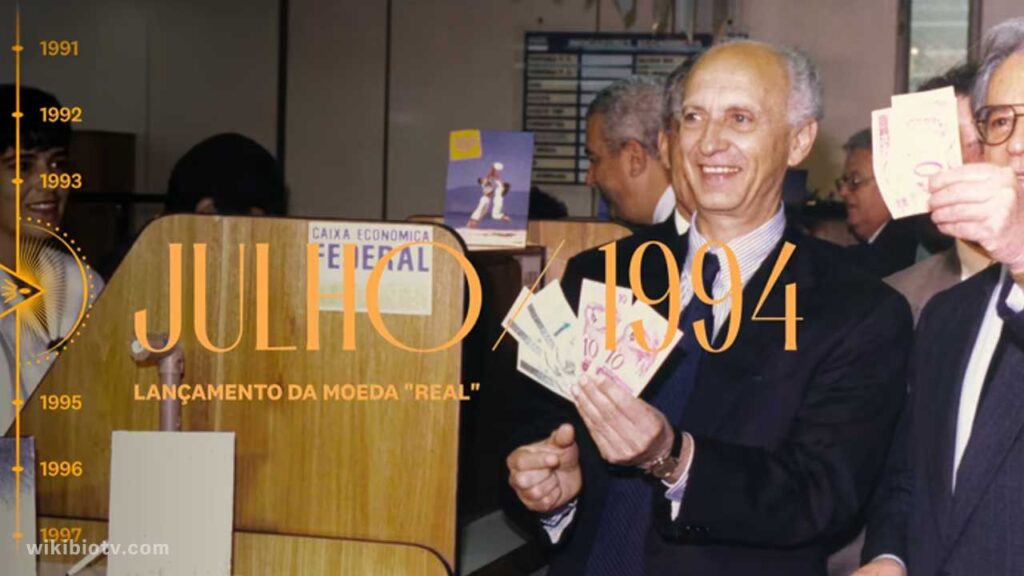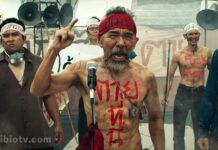
Netflix’s newly released “Nelma Kodama: The Queen of Dirty Money” is a thrilling and extremely controversial documentary that takes us deeper into Brazil’s secretive foreign currency exchange market. Directed by João Wainer, this is a crime documentary that tells the story of Nelma Kodama. It looks at her life as she rose in the ranks of the shady financial system, accumulating wealth and fame as a “doleira,” or black-market currency dealer.
Nelma herself narrates this story through several interviews after her release from prison. Nelma reveals how she grew up poor but managed to become part of Brazil’s shady financial industry. This included outsmarting men in a male-dominated career path that required quick thinking and risk analysis skills, all backed up by charisma.
Also read:
- Dancing For The Devil: The 7M TikTok Cult Documentary Series Explained In Detail
- “Illusions For Sale: The Rise And Fall Of Generation Zoe” (2024) Explained: Leonardo Cositorto’s Big Latin American Scam
- “The Doomsday Cult Of Antares De La Luz” Plot And Ending Explained, Did The World End?
- “The Asunta Case” Plot And Ending Explained, Asunta’s Killer Revealed..
Who is Nelma Kodama?

Nelma Kodama’s name has become a synonym for scandal in Brazil. From black market currency trade to an outstanding figure in Operation Car Wash, one of the biggest corruption investigations, her involvement in various crimes is enormous.
Nelma Kodama was an enabler who could solve any problem with a phone call. Named “The Queen of Dirty Money,” she asked herself what it really meant to break the law as black market dollar vendors followed their own rules. She saw it as a matter of honor and trust. This is how she described her activities, which were like conducting an orchestra but constituted white-collar crime, whose appearance was misleadingly neat.
In 2006, people first heard about Nelma when the currency exchange house she worked for was implicated in a money laundering investigation linked to bingo operations. It was only the beginning of all her financial crimes.
Years later, she was arrested in Operation Car Wash while trying to travel to Italy with 200,000 euros hidden in her underwear. She believed that she could compare herself with Beethoven or Mozart, who were both musical geniuses. Convicted of corruption, organized crime, and currency evasion, she famously sang “Amada Amante” with congressmen, a symbolic moment in her career. Her social media post about removing her ankle monitor and the judge’s remark about her disservice to society highlighted her controversial nature.
Behind every fortune lies crime, money laundering, and dollar dealers like Nelma. Black-market dealers and financial operators keep dirty money circulating, far away from legal scrutiny. Kodama was a “cleaner” for congressmen and dealers. She closed criminal transactions.
She made her first million dollars before reaching 30, but nearly ended up losing everything. However, determined not to be defeated, she bounced back, knowing full well that she had the potential to make much more income. Her house, decorated with Italian furniture, reflected its owner’s luxurious taste and successful life choices.
How Did Nelma Start Her Career?

Nelma’s journey began in her family’s butcher shop in Diadema before she ventured into the financial world. She got her start in currency exchange, thanks to her manager’s guidance, and quickly mastered the trade despite its male-dominated nature. When her partner, Júlio, hesitated to continue, Kodama stepped up, taking over and turning herself from an employee into the owner of Hawaii Exchange and Travel.
Operating in a market where underground dealings were once overlooked despite being illegal, Kodama excelled. Brazil’s volatile currencies and high inflation rates led people to seek out stable foreign currencies, making dollar trading a profitable venture. Kodama’s success in this unregulated market, characterized by limited rules and high demand, showcased her determination and expertise in navigating Brazil’s intricate financial environment.
Informal Trade Growth and Money Laundering Operations

In Brazil, the “Cruzeiro Real” was replaced by a new currency called “Real” in July 1994 under the Plano Real economic plan in an effort to put a stop to inflation and stabilize the Brazilian economy. Additionally, it marked a significant reduction in overreliance on the dollar as a store of value. It would be realized that through time, the black market for dollars became more deeply rooted in conventional criminal activities and grand corruption.
During this period, informal trade with China increased significantly, especially in São Paulo’s commercial hub, Rua 25 de Março. Nelma operated extensively at Pagé Plaza, among other places where contraband goods are known to be sold. She facilitated large financial transactions, enabling people to collect large sums (between $100,000 and $200,000) to purchase merchandise in Paraguay. Initially, these were carried out using cash, thereby leading to frequent robbery incidents. So, she transitioned into illegal wire transfers that made her dealings more secure. This involved working together with local and international dollar dealers to facilitate fund transfers without physically taking dollars across borders.
The task required working with dollar dealers, both local and international, to transfer funds without the need for the physical movement of cash across borders. In Nelma’s system, it acted as a modern digital bank, which helped in managing clients’ balances and converting money when necessary.
Who Were Nelma’s Rivals and Allies?
Nelma was challenged by competition from other dollar dealers like Mrs. Yan, who is among the major players among Chinese traders. Nonetheless, they became allies after a police raid on Mrs. Yan’s office, for which Nelma helped her escape. People who worked for her did say that they didn’t know anyone named Mrs. Yan and that Nelma had a nack for exaggeration.
As her business progressed, she required safekeeping for large sums of money and a trusted network. She made a profit by charging fees to the sellers as well as buyers, despite the fact that this was illegal business activity on her part.
Nelma had a romantic relationship with Alberto Youssef, who was one of Brazil’s most infamous money launderers in relation to the Banestado Case, one of Brazil’s biggest money laundering scandals. The complex and far-reaching nature of their operation could be seen in Youssef’s vast network and influence over people.
Alberto Youssef’s Influence And Involvement
A parliamentary inquiry committee was initiated by the Federal Senate in 2003 due to a scandal involving Alberto Youssef. This probe was, however, quickly forgotten as a result of several powerful contacts that the man had in Brazil. During the 1990s, Youssef began building a vast network of influence, closely associating with José Janene, a prominent politician from Paraná. Janene, who died later on, executed several transactions that were subsequently found to be illegal. As far as Janene was concerned, Youssef acted as his operative and messenger.
In April 2015, Pedro Corrêa, a former Brazilian congressman, received more than twenty years of imprisonment for engaging in corrupt practices and money laundering by Judge Sérgio Moro at the Paraná federal court. As part of Petrobras’ corruption scheme, Corrêa accepted bribes on behalf of the Partido Progressista. Before Petrobras said, other institutions had arranged party donations from businessmen through Youssef, who would handle such operations as moving and switching dollars to cash and then spreading out the money to public officials in Brazil.
Youssef was knee deep in these financial operations and turned to Nelma, who was a skilled dollar dealer, when he needed cash, especially in US dollars. He often referred to this dealer in familiar terms, indicating a close and practical working relationship. Despite not knowing the dealer personally, it was clear she was adept at solving money problems.
Youssef and Nelma lived together like a married couple for nine years. According to her, it was a period of love and trust, although Youssef had been arrested three times while with her. The woman then took charge of the business after Youssef’s activities were curtailed by legal restrictions. Alongside other influential people, such as Raul Srour, a Jewish boyfriend with whom she also went into business.
What Was The Aftermath of Operation Car Wash?
The Petrobras scandal that occurred in 2014 led to Operation Car Wash, one of Brazil’s biggest ever investigations into corruption and money laundering, involving top businessmen and politicians. Nelma was deeply involved in this affair. She got apprehended while trying to board a plane bound for Milan with 200,000 euros kept under her pants. Despite claiming the money was the only illegal item she had, her arrest marked a significant moment in the operation.
When she was imprisoned, she met many people involved in the scandal, like Marcelo Odebrecht and Maria Lúcia Tavares. Tavares’ testimony revealed a dedicated bribery department within Odebrecht, influenced by Nelma’s advice to weigh her options for freedom. Nelma became seen as a collaborator by the Operation Car Wash team, helping to unravel the complex web of corruption.
She loved to be recognized as a public figure, even proudly displaying her ankle monitor. She was summoned by the Parliamentary Inquiry Committee, where they had a chance to dissect Youssef’s personal life as well. However, despite all this limelight and controversy, she remained playful and composed, seeing herself as a single, important player in those happenings.
“Nelma Kodama: The Queen of Dirty Money” Ending Explained: Was Nelma Involved in Drug Trafficking?
Nelma, once again a city of Lisbon in Portugal, came into the international spotlight in April 2022. This time, the reason was far more serious than her previous brushes with the law. Nelma found herself arrested and accused of a grave offense: international drug trafficking. The allegations suggested that Nelma played a key role in orchestrating the illegal movement of narcotics across borders, marking a significant shift from her previous involvement in financial crimes during Operation Car Wash.
While sitting on a balcony at a hotel, Nelma was caught off guard by nine or ten police officers appearing suddenly and just as promptly arresting her. In Portugal, where she was apprehended, Nelma’s reputation preceded her, with authorities deeming her extremely dangerous due to the severity of the charges against her. Dossed up by other inmates while in custody at the Santa Cruz do Bispo Detention Facility in Portugal, Nelma had to bear the weight of these allegations.
Her lawyer spoke on her behalf and conveyed Nelma’s bewilderment at the charges. Her involvement in money laundering for a highly sophisticated drug cartel was revealed through the investigation. This was a huge shift from her previous role as an accused fraudster known as a “dollar dealer.” Her ex-boyfriend, in disbelief and disappointment, lamented her transformation from a figure in the world of white-collar crime to one associated with the illicit drug trade.
As of June 2023, Nelma was also accused of engaging in transnational offenses, including drug trafficking, and participating in organized criminal activities that complicated her legal position even more. In spite of growing obstacles, the attorney working for Nelma never gave up on winning her freedom through maneuvering extradition processes and legal battles. In October 2022, Nelma was eventually extradited to Brazil, where she continued to face the legal ramifications of her alleged involvement in drug trafficking.
All throughout this period, Nelma refused to accept guilt and expressed deep remorse for getting involved in such massive criminal activities. Her reflections on her past choices and the consequences they bore underscored a desire for redemption and a commitment to facing the challenges ahead with resilience. As her lawyers worked diligently to annul her previous sentence and fight for her freedom, Nelma’s story served as a poignant reminder of the complexities of human nature and the enduring pursuit of justice amidst adversity.





